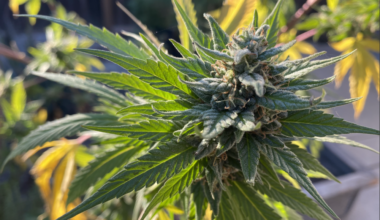State-legal marijuana businesses would be able to be listed on national stock exchanges and access key financial services under a bipartisan congressional bill that was filed on Thursday.
The Capital Lending and Investment for Marijuana Businesses (CLIMB) Act is being sponsored by Reps. Troy Carter (D-LA) and Guy Reschenthaler (R-PA).
While a main thrust of the legislation is to free up cannabis industry access to financial lending and investment opportunities, in part by providing protections for private financial institutions and government agencies that provide such services to traditional markets, one section stands out as especially novel.
It would provide safe harbor for national securities exchanges and market participants that “have listed, list, or intend to list, or permits the trading, or facilitates the offering, listing, or trading on a national securities exchange, of the securities of a cannabis-related legitimate business or a service provider.”
That’s a wordy way of saying that cannabis businesses would be permitted to list on major stock exchanges like Nasdaq and the New York Stock Exchange (NYSE). It would represent a boon for the burgeoning industry, legitimizing their presence on Wall Street.
—
Marijuana Moment is already tracking more than 1,000 cannabis, psychedelics and drug policy bills in state legislatures and Congress this year. Patreon supporters pledging at least $25/month get access to our interactive maps, charts and hearing calendar so they don’t miss any developments.![]()
Learn more about our marijuana bill tracker and become a supporter on Patreon to get access.
—
The bill more broadly says that no federal agency would be allowed to penalize a business or governmental authority for “receiving funding, appropriations, grants, contracts, or other forms of monetary or non-monetary assistance from a government authority, or from marketing, offering, or selling any security, banking, or insurance or other financial services product” just because the business or individual “provides business assistance to a cannabis-related legitimate business or service provider.”
So, for example, the bill would theoretically protect an agency like the federal Small Business Administration (SBA) from being penalized another agency (e.g. Justice Department) for providing its services to state-legal cannabis companies. However, it contains no language actually mandating that SBA begin providing such services to the industry.
Due to federal prohibition, state legal cannabis operators don’t have equal access to traditional lending and financing options as non-U.S. companies, creating significant barriers to entry.
The CLIMB Act would change that. Full release ⤵️ https://t.co/NdCo9nSoeu
— Congressman Troy A. Carter (@RepTroyCarter) June 23, 2022
“The bipartisan CLIMB Act is a huge opportunity to bring equity and equal opportunity into our nation’s burgeoning cannabis industry,” Carter said in a press release. “From my work on the Small Business Committee and by working directly with small, minority, and veteran-owned cannabis businesses, it’s clear that access to capital remains one of the biggest barriers to entry and to success in the industry.”
“By bringing symmetry into the business ecosystem with the CLIMB Act, we can help communities that have long been harmed by the criminalization of marijuana move to now be leaders in the business sphere—and that’s what the American Dream is all about,” he said.
Reschenthaler emphasized that “American cannabis companies are currently restricted from receiving traditional lending and financing, making it difficult to compete with larger, global competitors.”
“The CLIMB Act will eliminate these barriers to entry, and provide state legal American cannabis companies, including small, minority, and veteran-owned businesses, with access to the financial tools necessary for success,” the congressman said. “This bipartisan legislation will boost the economy, create jobs, and level the playing field for American businesses.”
This legislation takes a targeted approach to cannabis reform in the financial and regulatory sector, whereas another bipartisan bill that advocates and stakeholders are pushing for—the Secure and Fair Enforcement (SAFE) Banking Act—would more broadly safeguard financial institutions that work with marijuana businesses from being penalized by federal regulators.
With respect to SAFE Banking, however, news broke on Thursday that one possible vehicle for the reform may have hit a dead end, with congressional leaders agreeing not to keep the cannabis language in a large-scale manufacturing bill called the America COMPETES Act.
“CLIMB offers imperative financial access for women and minority entrepreneurs in cannabis,” Women Grow President Gia Morón said in a press release distributed by Carter’s office. “While SAFE Banking presents a security harbor for cash deposits, that only addresses one critical role in business banking. Women and minority owned enterprises in cannabis continue to face lack of access to lending, grants, and investment options.”
National Cannabis Industry Association CEO Aaron Smith added that the new legislation is “a much-needed reform that will help level the playing field for main street cannabis businesses across the country.”
But Justin Strekal, founder of Better Organizing to Win Legalization, criticized the bill’s lack of provisions mandating that federal agencies like SBA stop discriminating against cannabis businesses.
“I am deeply concerned about the lack of specificity regarding protections and directives to allow small businesses to access capital in this bill,” he told Marijuana Moment.
(Disclosure: Strekal supports Marijuana Moment’s work through a monthly Patreon pledge.)
“By allowing Wall Street to invest millions, possibly even billions of dollars to their well-connected friends just now entering the cannabis industry, the CLIMB Act could inadvertently be a catalyst for even further consolidation in this emerging nascent marketplace,” he said. “This would be in stark contrast to everything that activists and advocates have fought for over the decades.”
Read the text of the CLIMB Act below:
Voters In Five Texas Cities Will Decide On Marijuana Decriminalization In November, Activists Say
Medical Disclaimer:
The information provided in these blog posts is intended for general informational and educational purposes only. It is not a substitute for professional medical advice, diagnosis, or treatment. Always seek the advice of your physician or other qualified healthcare provider with any questions you may have regarding a medical condition. The use of any information provided in these blog posts is solely at your own risk. The authors and the website do not recommend or endorse any specific products, treatments, or procedures mentioned. Reliance on any information in these blog posts is solely at your own discretion.






